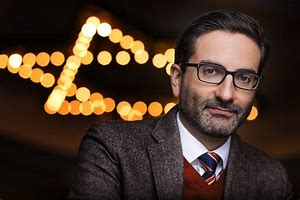-
27 December 2018
A Reflection from Rabbi Gil Steinlauf, Scholar-in-Residence

In the Talmud, there’s a fascinating quote by the great sage Hillel, who lived over 2,000 years ago, before the destruction of the Second Temple in Jerusalem:
…Hillel the Elder would say:
Im ani kan, hakol kan, “If I am here, everything is here.”
v’im eini kan, mi kan? “And if I were not here who would be here?” (B. Sukkah 53a)
These words read almost like a riddle. What does Hillel mean? Is he being egotistical? Does he think himself so important that if he weren’t there, nothing would be worth happening? Not likely. Hillel is remembered as a remarkably joyful, patient, kind and humble teacher, beloved by his many students precisely because he did not think himself so far above anyone else.
Hillel’s teaching, therefore, is something altogether deeper than egotism or arrogance. In fact, this teaching is not just about Hillel; it’s about any and all of us. His message is really about the power of presence. Hillel taught these words at a large public festival, the Simchat Beit HaSho’evah – the “water-drawing festival” – that was celebrated in ancient Jerusalem at the end of Sukkot. It was a time of community and a time of joy. And in the midst of all of this, Hillel taught us what makes the gathering of all the people a true simchah or joy: its presence. At its simplest level, just “showing up” is worth so much when it comes to building community and sharing a simchah.
Hillel doesn’t just stop at the simple act of being physically present; he also emphasizes the importance of being emotionally, socially and spiritually available. In other words, in life, it’s not only about physically showing up, but also about the quality of the relationship. We all know that human beings are not meant to live in isolation; we need each other. Hillel takes this idea to its spiritual level, teaching us that, if we “show up” for others, anything is possible. But even more than that, if I am there for my community, I can trust that they will be there for me.
Hillel’s teaching is one of my absolute favorites, because it unlocks the heart of what it means to be obligated to others in a community. We typically see obligations as burdensome, but Hillel sheds new light on responsibility: truly being present for others, with others, is what it means to be alive. This presence in relationship to our people, to God, to our heritage, is why we’re here on this earth in the first place. My community’s wellbeing depends on my choice to show up, be present and pay attention, with and for others in my community. By doing so, not only am I creating a simcha together with others, but I’m am experiencing true simcha for myself, because I’m really alive in that moment. The more I am present and create meaningful moments with others, the more I can know the presence of God in life.
Yes, this message is a great pitch for the importance of coming to synagogues, showing up at community events and making them meaningful through our being there, but it’s also so much more than that. Hillel’s words are a teaching that apply not just to large public events, but to more intimate gatherings as well. Hillel’s words are about moments with our family, with our wives and husbands, with our friends. Hillel’s words are also about quiet moments when it’s just us and God. So often in life, we’re in the midst of a situation but we’re not really there at all. We’re lost in our thoughts, our worries, our problems, our cell-phones, our angers, fears, or resentments. When we show up not just physically, but spiritually as well, when we bring our full presence to the moment, then the whole world is truly there—everything and everyone, because we are truly awake and alive.
One of the things that we can all be so proud of at Federation and throughout Jewish Greater Washington is that we are building a real sense of community day by day, year by year. May we all remember Hillel’s teaching as a motivation for our continued presence for each other throughout the years, both at shul and at home. May we always remember that our presence is so much more than an obligation. Our presence in this world is a precious miracle, and when we honor our presence with each other, then indeed, all the world, and everyone in it is all the more joyful.
